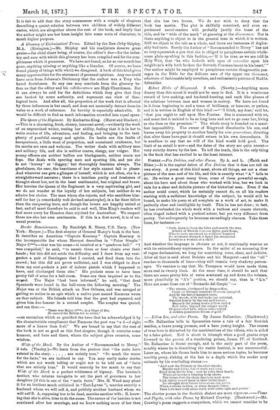Border Reminiscences. By Randolph B. Marcy, U.S. Navy. (New York:
Harper.)—The first chapter of General Marcy's book is the best. It describes an American "Captain Kearney." Captain Kearney is the incomparable liar whom Marrvat describes in "Peter Simple." Major C""ws—that was his name—is insulted at a " quadroon ball." "I was compelled," he said, " to smash three or four chairs over their heads ; but this did not settle the difficulty, and I drew from my vest- pocket a pair of Derringers that I carried, and fired them into the crowd ; but this did not prove sufficient, and I was obliged to draw from my coat-pockets a pair of holster pistols which I happened to have, and discharged them also." His pockets seem to have been pretty full of arms for a ball-room. Some one then inquired as to the sequel. The Major "had been informed," he said, "that dead Spaniards were found in the ball-room the following morning." The Major was at the British attack on New Orleans, and was enraged at getting no notice in an epic which a native poet named Emmons wrote on that subject. His friends told him that the poet had repented, and given him due honour in a second couplet. The couplet was quoted, and ran thus :— " There was Major Owe, in a blase of fire, He caused the British for to retire,"
—an encomium which so gratified the hero that he acknowledged it by the characteristic compliment that Emmons the poet was "a d—d sight more of a knave than fool." We are bound to say that the rest of the book is not as good as this first chapter, though it contains some humour, and here and there, where the subject gives occasion, some wisdom.


































 Previous page
Previous page